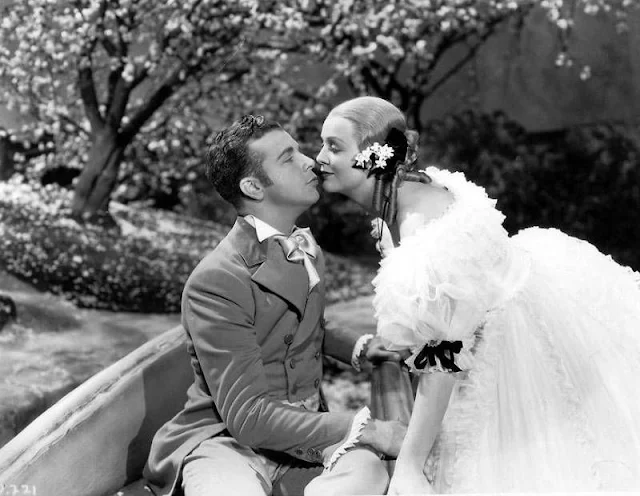Obviously,
The Gay Divorcee wouldn't pass muster as the title for a heterosexual romantic comedy today, but the film's producers had to jump a few hurdles even in 1934, when the Hays Office censors were about to yield to the much stricter Production Code. The title of the Broadway musical on which the movie was based was
Gay Divorce, and Catholic censors were strictly opposed to the idea that divorce could be anything other than a sin. However, assuming that she'd done her penance, a divorcee could be gay (in the older sense), just as Franz Lehár's old operetta asserted that a widow could be merry. This was the first teaming of Fred Astaire with Ginger Rogers in which they were the stars: They had been supporting players in their previous film,
Flying Down to Rio (Thornton Freeland and George Nicholls Jr., 1933), and their dance numbers had caused such a sensation that RKO was eager to craft a musical around them. Pandro S. Berman, head of production at the studio, purchased the rights to
Gay Divorce, in which Astaire had been the star on Broadway, and put a team of writers to work revising the musical's book by Dwight Taylor. The Broadway version had a score by Cole Porter, but all but one of the songs were jettisoned for the film. That song was the best, however: "Night and Day," which gave the stars their first great fall-in-love
pas de deux. The screenplay, by many studio hands, takes the farcical premise of the play: Mimi Glossop (Rogers), seeks a divorce from her husand, and since they're in England, where the only justification for divorce is adultery, she, with the help of her Aunt Hortense (Alice Brady) and the lawyer Egbert Fitzgerald (Edward Everett Horton), arranges to be caught in a hotel room with a professional co-respondent, Rodolfo Tonetti (Erik Rhodes, who also played the role on Broadway). Meanwhile, however, she has fallen in love with Guy Holden (Astaire), an American she has just met -- and, of course, met cute. Through a sequence of screwball accidents, she winds up thinking that he's the co-respondent, and is disgusted that he should have such a sordid job. Eventually, everything is sorted out with the help of a hotel waiter (Eric Blore, also from the Broadway cast). In the middle of everything, there's a 20-minute-long production number centered on the film's big song, "The Continental," for which composer Con Conrad and lyricist Herb Magidson won the first Oscar ever given for a song written for a movie.
The Gay Divorcee would rank with the best Astaire-Rogers films if it had a better score. Aside from "Night and Day," the rest are mostly forgettable novelty numbers, like "Let's K-nock K-nees," which is performed by a then-unknown Betty Grable with Horton and a gang of chorus members. Still, the movie lifted my spirits on Inauguration Night the way it must have soothed people's feelings during the Depression.












